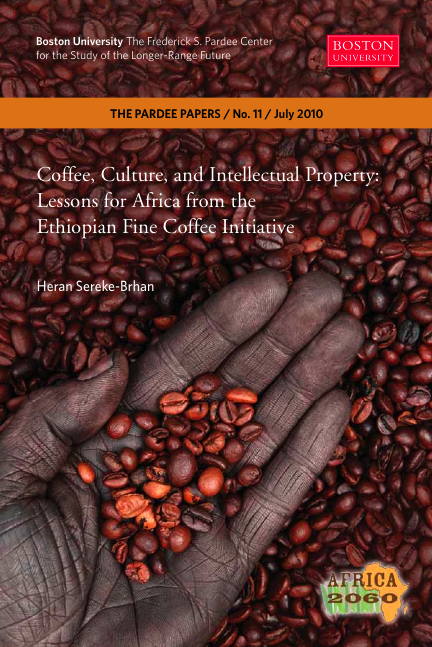The Pardee Papers, No. 11, July 2010
 Coffee, Culture, and Intellectual Property: Lessons for Africa from the Ethiopian Fine Coffee Initiative
Coffee, Culture, and Intellectual Property: Lessons for Africa from the Ethiopian Fine Coffee Initiative
By Heran Sereke-Brhan
July 2010 (37 pages)
IBSN 978-0-9825683-5-4
Download PDF
The initiative to register trademark for Ethiopia’s fine coffees was launched in 2004. What seemed a quiet progression of actions by the Ethiopian Intellectual Property Office quickly grew to command international media attention. Opinions differed as to whether rightful claim could be exercised over an agricultural product that happened to be growing in a particular location. The fact that a leading specialty coffee company opposed the initial registry attempt added further charge to the issue, as it subsequently became cast as a battle between a country with meager means and an avaricious multinational with little regard or remorse. Little research has been done about this important action and its potential application to other sectors of the African economy and cultural resources. This paper reconstructs part of the initiative in a preliminary exploration of its significance for the future. The Ethiopian trademark initiative provides the basis to examine related uses of intellectual property rights (IPRs) as a powerful potential tool for development. Lessons learned in this case study suggest similar benefits could be garnered for other African agricultural products that fulfill registry requirements. Even beyond trademarks and commodity products, exercising IPRs to identify and protect creativity offer boundless possibilities for Africa that have yet to be galvanized.
Heran Sereke-Brhan is a Post-Doctoral Fellow at the Frederick S. Pardee Center for the Study of the Longer-Range Future and Visiting Researcher at the African Studies Center at Boston University. After earning a doctorate in African History from Michigan State University, she has initiated and participated in projects that combine her interests in historical research with her passion for the arts and culture, including art exhibitions, performances, and literary publications. This paper on Ethiopian coffee trademark registry is part of her recent broader inquiry into issues of intellectual property and African culture production.
This paper is part of the Africa 2060 Project, a Pardee Center program of research, publications, and symposia exploring African futures in various aspects related to development on continental and regional scales. For more information, visit www-staging.bu.edu/pardee/research/ .